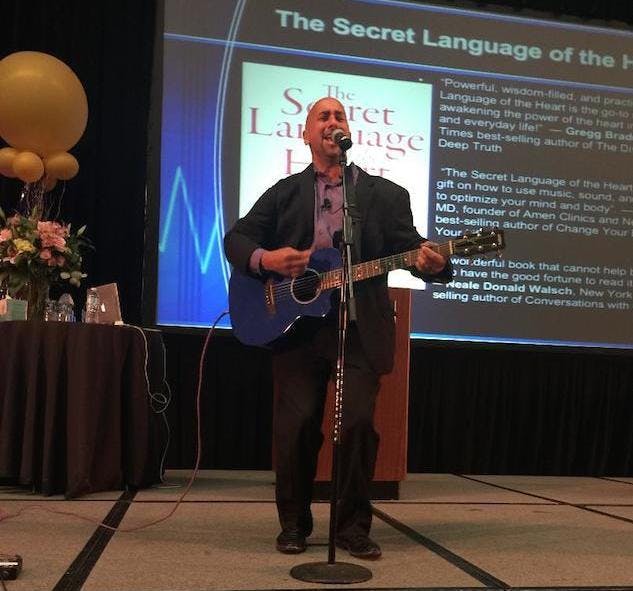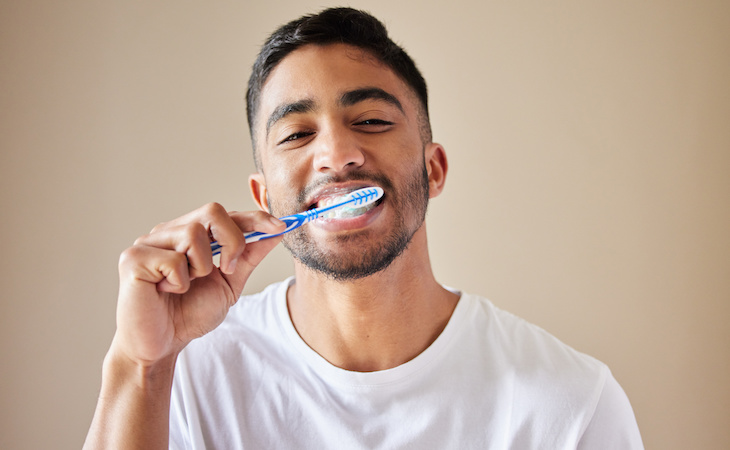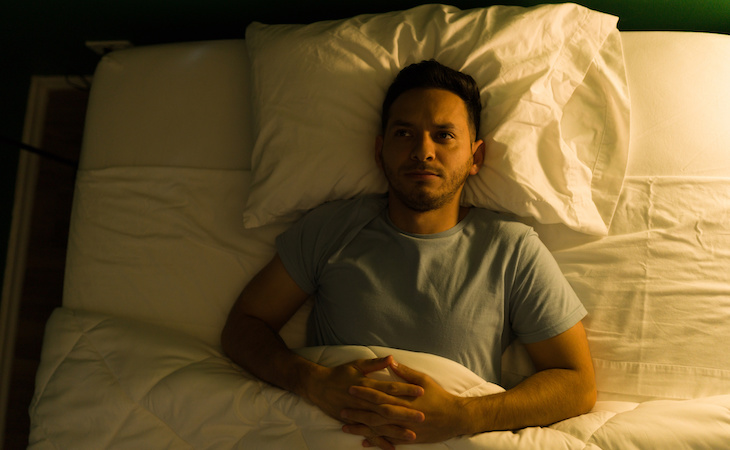Grammy-winning producer Barry Goldstein knows that there’s more to music than a catchy tune. He believes it’s a way to reach a state of well-being physically, mentally, emotionally, and spiritually. He also believes the right bedtime playlist can make the difference between tossing and turning all night and drifting off into true, rejuvenating sleep. In fact, he’s made a career out of composing music specifically designed to enhance your health.
We sat down with Goldstein to learn more about how music can improve your well-being (including your sleep) so profoundly—and snag his best tricks for using music in your bedtime routine.
Q: When did your interest in music begin?
I was very young—probably like four—and my mom taught me to play piano by ear. I was always intrigued by music and sound and vibration, although I wasn’t calling it that then. But I remember listening to how the piano filled up a room and how the note sustained feeling, so I had a real connection to music from a very early age.
Q: How did that transform through the years and become your career as it is now?
As I got older, I started to play guitar and write songs, and that developed into me wanting to arrange those songs.
I became a New York City record producer, spending a hundred hours to produce a four-minute song. As I experienced the stress of the city—and my own stresses and anxieties—I started researching how music could be used as a tool for healing and transformation.
I learned that music has a profound effect on our physical bodies and can affect our heart rates, even moving us from excited states to relaxed states. I found out that targeting our hearts to a relaxed 60 to 80 beats per minute has a host of beneficial effects.
So I began to take these musical journeys with my metronome set to 60 beats per minute. I never thought that anyone would listen to these pieces; they were really for my own relaxation. I would let myself flow with the music, and I found myself moving to these really relaxed and meditative states in the process. When I began to play them for friends of mine—some of whom were in dental or massage therapy school—they loved it. And that’s where it all started.
I started sharing this music, which later became my series called Ambiology. Doctors started using it in operating rooms, to deliver children, to help people sleep.
After digging into dozens of studies about how music can be used to benefit everything from Alzheimer’s to autism to Parkinson’s, I wrote a book, The Secret Language of the Heart: How to Use Music, Sound, and Vibration as Tools for Healing and Personal Transformation.

Q: What have you learned about how music can benefit sleep?
Music that has long tones, limited melodies, and that 60 to 80 beats-per-minute tempo has been shown to have the most benefit for relaxation and sleep.
With this type of music, there’s less movement going on and less for our minds to interpret. And when it comes to sleep and relaxation, the less we think, the better.
Melody engages our minds. When we hear a melody, we move to a decision-making process about whether we like it or not. It might also trigger specific emotions that can also keep you from winding down.
To promote sleep, music needs to be like a blank canvas. For example, if you light a candle in the room, you know it’s lit and has created a more peaceful environment without you having to watch the flame directly.
That’s why you also want your sleep-inducing music to be lyric-free. Lyrics move us into our analytical mind and trigger emotions.
Research shows that listening to relaxing music can help decrease levels of the stress hormone cortisol and increase dopamine, which is associated with pleasure and reward—all things that set us up for better sleep.
Related: 10 nighttime activities to help you relax
Q: How else can music be used to benefit our health?
There are so many uses developing right now.
In Alzheimer’s, for example, relaxing music has been used to lessen a lot of the agitated behaviors, like anger or restlessness or screaming, that are associated with the condition. Music from certain parts of a patient’s life has also been used to help them access memories of that time that they might not otherwise be able to recall.
“Research shows that listening to relaxing music can help decrease levels of the stress hormone cortisol and increase dopamine, which is associated with pleasure and reward—all things that set us up for better sleep.”
In Parkinson’s, music is being used as a tool for rhythm to help patients improve their gait and walk more effectively, despite the condition’s effects on their motor centers.
Relaxing music is even used to help ease nausea in cancer patients undergoing chemotherapy.
Q: Why do you call music a “vehicle for transformation”?
For me, transformation means moving from one state to another, hopefully improved, state. Music is a bridge that takes us from one state to another. It can take us from a state in which we’re stressed, tense, fearful, or anxious, to a parasympathetic state, in which we’re relaxed and at ease. In this state, our mental and physical being—including digestion and detoxification—improves. We sleep better, we recover better, we feel better.
That’s really where having what I call a “music program” works wonders. Think of it like meditation. You can plug it in daily at certain times of day to help you feel motivated or wind down for sleep.
Q: How do you incorporate music into your daily routine—including your sleep routine?
I’m constantly using music to shift my mood, to shift my energy, and to really improve my overall quality of life.
I love to start my day with a piece of music that’s going to set the tone of the day. If I want to boost my energy, I listen to a piece of music that’s motivating—one that has a lot of rhythm and ignites my energy. If I wanted to be more relaxed, I would listen to a more peaceful piece of music, something more tranquil.
Around midday, I check in with myself to see what kind of music I need. Have I experienced a lot of stress in my day? Do I need to listen to a calm piece of music? Do I need to listen to a joyful piece of music? Have I been sitting behind my desk all day? Do I need to incorporate rhythm and get up and stretch and dance?
Then, at night, I think of music as dessert; something sweeter and gentler. I think the reason a lot of us have trouble sleeping is that we don’t give ourselves the opportunity to process our day. We go from being type-A active straight to sleep.
We’re just so stimulated by social media and fast-paced living, so we need the music in our evenings to really help us wind down.
I put on my relaxing music about an hour before I go to sleep to make my night more peaceful and serene and condition myself to go to sleep. I turn off the TV, close my computer, maybe light a candle. I feel my heart rate slow down, my breathing slow down, my thinking slow down. Even our brainwave patterns begin to slow.
I find this ritual not only makes it easier to fall asleep but improves my overall sleep quality. It also helps me move into a state of peace and gratitude instead of worrying about what happened that day.
Listen to Goldstein’s music playlist for deep relaxation before bedtime:
Q: What pieces of music do you love before bed?
I really love my Ambiology series, which is composed of hour-long pieces set to 60 beats per minute. I’ve worked on this music for two decades specifically to ease my own anxieties, stress, and sleeping challenges. The pieces don’t trigger emotion; they’re just very, very peaceful.
The pieces “Ambiology 1” (called “The Heart”) and “Ambiology 6” (called “Genesis”) are my favorites for sleep.
“Music is a bridge that takes us from one state to another. It can take us from a state in which we’re stressed, tense, fearful, or anxious, to a parasympathetic state, in which we’re relaxed and at ease.”
I’ve also created some music programs with the neuroscientist Daniel Amen, MD, that a lot of people use for sleep. Both the “Bright Minds” and “Feel Better Fast” programs work well.
Q: When you look towards the future of music and our health, what do you see?
I really see music as really developing as a tool for transforming our state of being and really enhancing our health and overall wellness.
Music is low-cost, non-invasive, and has very few side effects, so I think the research on its use in all sorts of health conditions and contexts is only just getting started.
Listening to a podcast can also help you snooze. Here are the best podcasts for sleep.








